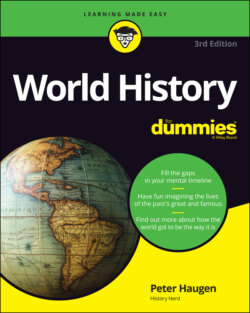Читать книгу World History For Dummies - Peter Haugen - Страница 101
Remembering Far-Flung Cultures
ОглавлениеOver the long stretch of time when the Roman Empire was rising and falling, other cultures around the globe continued to grow and change, too, many beyond the main focus of this chapter, but still important. Just because certain cultures seem so influential to the course of history, you don’t have to forget about how many, varied ways that human societies developed and progressed. For example,
The Aksum: In northeast Africa, where Ethiopia is now, the Aksum people put together an empire that grew rich after 200 AD by trading with places as far away as India. The Aksum became Christian in the fourth century AD and spread the new religion to neighboring peoples.
The Celts: Tribal people with sophisticated metalworking skills but no written language, the Celts kept expanding their European territory from central Europe toward the west and south. By the fifth century BC, they were dominant in Gaul (modern France), England, Ireland, much of Scotland, and parts of Spain. By the third century BC, the Celts spread through the Balkans. They made beautiful golden jewelry and harness ornaments. In some places, the Celts built large forts atop hills and fought Roman legions as the empire absorbed Europe. Later, the Celts clashed with Romans and other invaders who overran their territory through the early centuries AD.
The Japanese: Discovering how to mine and smelt iron, the Japanese joined the Iron Age sometime in the third century AD. They buried emperors and other big shots with their weapons and other valuable possessions in mounds made of stone and earth.
